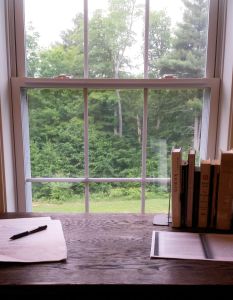
Thanks to President Give ‘em Hell Harry
having sworn he’d punch his nose and other body parts
for the review that said Margaret, darling First Child,
couldn’t sing, the music critic was famous in those years.
I, meanwhile, was a nobody, a seven-year-old
stashed glumly on a metal chair
in the back of a high-ceilinged studio,
waiting out each Tuesday afternoon, nose
in a comic book, ears closed to the old teacher in front
(a blind bear banging his cane “faster”),
and to the Prokofiev my mother was learning for a comeback—
which she had, the East Garden Court
packed, all bustling coats and scrapes of chairs,
then silent for the calm destruction
of everything they knew about music;
then on their feet with cheers.
The next day in the Post, the critic cheered too,
but at the end had to raise his hand to the obligatory oath,
raising an eyebrow at the Russian repertoire:
“Mrs. Weisert, do you play American music?”
…Anyone can see 1952 was not the year
to throw a bright red flag of a sonata into the airwaves
of our nation’s capital where Margaret had so recently sung
“God Bless America” in Constitution (DAR) Hall
under the beaming gaze of those other, gray-haired daughters
of the you know what, which along with God was then in full cry,
but my mother’s choice wasn’t – I think wasn’t – so much
courage, or a political point (her fellow-traveler years
long past), but the simple fact: that year, this work
was the hardest, newest thing in town,
and goddammit Prokofiev was hers.
And mine? At the radio’s opening shot
my heart takes off, knowing the charge of notes
whole, and the bursting charge that’s next, riding
the sweep across the steppes, the blizzard fugue;
wrapped tight around it straight through to the breathless end
when I look up – now from the New York Times –
look hard, past a comic book, teacher’s cane,
and metal chair; past HUAC and hearings;
past the last days of the Truman years,
and careful what you say, who you tell, what you –
to a woman in a piano studio starting over
every Tuesday, damp, out of breath
on the thirtieth, the fiftieth run, oblivious
to the dark times, and even to her child
learning something, that year, about art.
In The Scheme of Things, David Robert Books, 2015.

